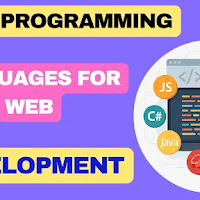Why Choosing the Right Programming Language Matters in Web Development
Job Prospects: A good knowledge of current programming languages increases the possibility of being offered a well-paid job or even a freelance opportunity in the fiercely competitive world of web development.
Maintenance and Scalability: Many programming languages are ideal for maintaining and scaling, for projects that are expected to grow and change.
JavaScript – The Ubiquitous Language of the Web
Key Features:
With the advent of Node.js, you can run JavaScript server-side, and have some backend logic.
Developing real-time web applications like chat apps, live notifications or collaborative apps.
Node.js can be used to provide the backend for front-end applications that manage APIs and interact with a database.
Are you a complete beginner in web development and looking for the best programming language to work with for your web development tasks?
Or do you have an interest in web development and you want to learn programming languages to improve your skills?
Then definitely, JavaScript is the first language you should learn.
You can use JavaScript in most browsers and it is an essential skill.
If you get to know JavaScript, you have just doubled your environment.
This is the best thing for your profile as a web developer.
Python – The Versatile Powerhouse for Back-End Web Development
With easy syntax and heavy functionality, Python has become more than just a passing fad.
Although not a front-end language by nature, Python holds its own in server-side web programming and more.
Key Features:
Celebrated for its clean, readable syntax that enables beginners to learn and programmers to develop large codebases.
Comes with powerful frameworks such as Django and Flask, which make building highly secure and scalable sites and web apps a very flexible and effortless task.
Deep integration with automation, data science, and machine learning enabling web applications to have advanced AI built-in.
A huge standard library and many third-party libraries to address almost any task.
Use Cases:
Developing stable and scalable web applications at the server-side.
Building a RESTful API consumed by front-end clients.
Building data-driven websites that are analytic and reporting-focused.
Automating web stuff (scraping or data processing, for example).
Why Learn Python?
Its strength is the simplicity and expressiveness but also the power, giving developers the freedom to develop scalable web applications, while being able to rely on top-end areas such as AI and data science.
It has the exact features for speed and dexterity you need for rapid web development.
Why is PHP still the king of server-side scripting?
Overview:
For 25 years PHP has been used by millions of projects, from small to some of the world\'s largest applications.
While new languages continue to appear, PHP has established itself as a competitor for server side web development.
Key Features:
Good to include directly in HTML so it's beginner-friendly.
With robust framework support for Laravel, Symfony and CodeIgniter, complex applications are easier to develop.
Great integration with popular databases, especially MySQL, which is the driving force for many dynamic websites.
To understand the crucial role web servers play in supporting these sites, see: How Web Servers Work and Why They Matter
TypeScript – JavaScript with Strong Typing for Large Applications
My language of choice these days when I am not writing Python (and sometimes even when I am) is TypeScript:
a superset of JavaScript that has static types, bringing the delights and expressiveness of types to lots of people who currently don't have them, while also making me much happier to write JavaScript and therefore be more productive and less crazy over the long term.
It has quickly gained popularity in conjunction with JavaScript frameworks.
Key Features:
Ensures type safety to minimize errors through validation of code at the compile time.
Excellent tooling and support in modern IDEs (Integrated Development Environments) contribute to a good developer experience.
Easily works with existing JavaScript and Java libraries.
A popular tool in popular frameworks such as Angular and most React projects.
Use Cases:
Built big front-end web apps.
This is not about building Windows but about building a company building Windows.
Building reusable libraries and components.
Why Learn TypeScript?
Developers who are concerned about scalability and maintainability have strong arguments to weigh for TypeScript.
Its adoption is growing in the industry too, so it is a useful skill to have in order to future-proof your web development career.
Ruby - Elegant and Productive Web Development / Recently Read
Overview:
Ruby (and I’ll focus on Ruby on Rails) is perhaps best known for being sexy, developer-friendly, and enabling quick time-to-market.
It is especially popular with startups and product prototyping teams.
Key Features:
Developer happiness with an emphasis on readability and a syntax which looks like natural language.
The Rails framework is conventional over configuration, which means you write less code because the developer should use the naming convention instead of writing complete code.
It provides a set of robust tools that adhere to the DRY (Don’t Repeat Yourself) principle.
Ruby is simple and Rails is very productive.
These attributes combined make it a very attractive stack for developers who value speed and maintainability.
People in the ecosystem are still iterating on tools for making web programming feel agile.
Java – The Enterprise Workhorse Overview:
Java is a workhorse that has powered the enterprise for years.
It fuels ambitious web applications, particularly from such industries as banking, finance and the government.
Cross platform with “Write Once, Run Anywhere” approach.
Sturdy, safe, and high-performance, good for the mission-critical applications.
Just an aside – mature ecosystems that include things like Spring Boot that make web development faster.
Why Learn Java?
Companies are still hunting for Java as a valuable skill until now.
It’s a good option for devs working on larger enterprise-level projects and looking at the big picture of a career in software engineering.
Go (Golang) – Modern Language for High-Performant Web Services
Overview:
Go (Golang) is built by Google.
It is super-fast, easy, and great for concurrent operations, which is perfect for developing web services and microservices.
Key Features:
Compiled language and fast to run.
The extra tools, such as goroutines, lighten the load for multithreading.
Straightforward syntax and a solid batteries-included library.
Gaining popularity for cloud-native and container applications.
Use Cases:
Swift - Expanding Apple’s Horizons with the Web
Overview:
It’s best known for iOS and macOS development, but as Swift continues to spread, server-side frameworks like Vapor show you how to run Swift on a web backend.
Key Features:
For Apple ecosystem developers, Swift is the obvious choice:
it means you can develop applications across devices, while writing neat, clean, solid code, and on the server too, helping you to write small and lightweight web applications efficiently.
Web Development Project: How to Pick the Right Language?
There are many factors to consider when you’re looking to choose a programming language for web development:
If it is a very small ReadMe website (not very complex), then you can do away with HTML, CSS, and JS.
Those enterprise applications you cannot build using HTML, CSS, and JS; you need a productive backend language like Java, Go, etc.
Playing to Your Team’s Strengths: Your development time and costs may be lower if you already have an experienced team.
Low-Level Needs: There are also applications, such as those with real-time needs or when high-throughput is the goal, that necessitate an efficient language with concurrency support.
Community and Ecosystem: More libraries, frameworks, and community support. Popular languages have more libraries, frameworks, and community help.
Future Maintenance: Strongly typed languages have good tooling (e.g., TypeScript) and make it easy to maintain over time.
Budget and Hosting: Some languages have cheaper hosting options. (in this case, what matters is the project budget).
Important Hints to Learn Web Development Languages
Conclusion
Web development languages have strong contenders for all requirements.
In all, JavaScript is popular, Python is powerful, PHP has senior status, and now we also have Go, TypeScript, and so on – something for everyone, in a manner of speaking.
When weighing which programming language is best for your web project, it all comes down to your objectives, your team’s capabilities and the exact nature of your project.
Now that you have a foundational understanding of these languages, and still have an internal flame for learning more, you are set up to do more than just survive in the modern web as a web developer.









